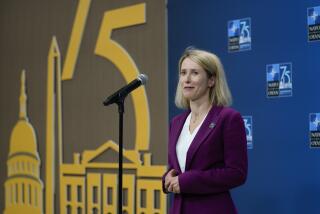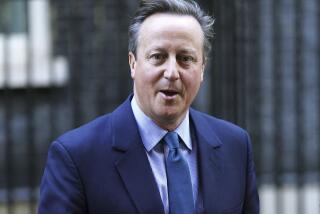Major Revamps Cabinet to Consolidate Renewed Authority : Britain: Pro-Europe Heseltine gets new post of deputy premier and center-rightist Rifkind becomes foreign secretary.
- Share via
LONDON — Newly reelected as Conservative Party leader, Prime Minister John Major moved quickly Wednesday to consolidate his authority with a sweeping overhaul of his Cabinet.
He appointed Trade Minister Michael Heseltine to the new post of deputy prime minister, where the pro-Europe veteran is expected to play a leading role in shaping party policy in the run-up to the next national election. The Tories are badly trailing the Labor Party in opinion polls as the favorite to win the next general election--which must be called by the spring of 1997.
Heseltine, who becomes the government’s chief trouble-shooter, declared, “This is a remarkable opportunity. We’ve got new faces and exciting ideas to drive this country forward.”
In another critical appointment, Major moved center-right Defense Minister Malcolm Rifkind to the post of foreign secretary. Rifkind replaces Douglas Hurd, who announced his retirement the day after Major called a special election for the party leadership two weeks ago. Major handily won that election Tuesday.
Employment Minister Michael Portillo, the leader of the right-wing, anti-European Union members of the Tory party, becomes defense minister, a move that is seen as the only conciliatory gesture to the anti-Major forces. “Most of the Cabinet are from the center or left of the party,” observed one political analyst in Parliament. “The right has little to show in it.”
The incumbents of two senior Cabinet posts remain in place: Chancellor of the Exchequer Kenneth Clarke and Home Secretary Michael Howard.
Patrick Mayhew also stays in his job as Northern Ireland secretary, where he is engaged in the difficult, delicate work of conducting the peace process with Sinn Fein, the political arm of the Irish Republican Army.
But Jeremy Hanley, the hapless Conservative Party chairman, has been replaced by Transport Minister Brian Mawhinney, who led Major’s campaign for reelection as party leader.
Major abolished the post of employment minister to combine it with education, where Gillian Shephard, one of two women in the Cabinet, remains. She said the merging of the departments indicates how important education and training are to employment.
The other female Cabinet member, Health Minister Virginia Bottomley, shifts to become national heritage secretary; that was a straight swap with Stephen Dorrell.
Four Cabinet officers lost out entirely: party chairman Hanley; David Hunt, head of the catchall Duchy of Lancaster; scandal-prone Jonathan Aiken, chief secretary to the treasury, and lackluster Chief Whip Richard Ryder.
Scottish Secretary Ian Lang becomes trade minister; George Young, transport minister; Douglas Hogg, agriculture secretary; Michael Forsyth, Scottish secretary; Agriculture Minister William Waldegrave, chief secretary to the treasury; former Welsh Secretary John Redwood, who resigned to challenge Major for the party leadership, was not offered a post in the government. His job was taken by William Hague, a sub-Cabinet minister.
There were several changes at sub-Cabinet levels of government. The composition of the Cabinet was strongly centrist, with no Euro-rebels, who oppose closer ties with the Continent--a state of affairs not calculated to please the hard-line rightists. As one grumbled, “If Major thinks that this is a recipe for peace and unity in the party, he must be joking.”
John Prescott, deputy leader of the Labor Party, declared: “After two weeks of political crisis and Tory infighting, this is a depressing anticlimax. Nothing exciting, nothing imaginative.”
More to Read
Sign up for Essential California
The most important California stories and recommendations in your inbox every morning.
You may occasionally receive promotional content from the Los Angeles Times.












